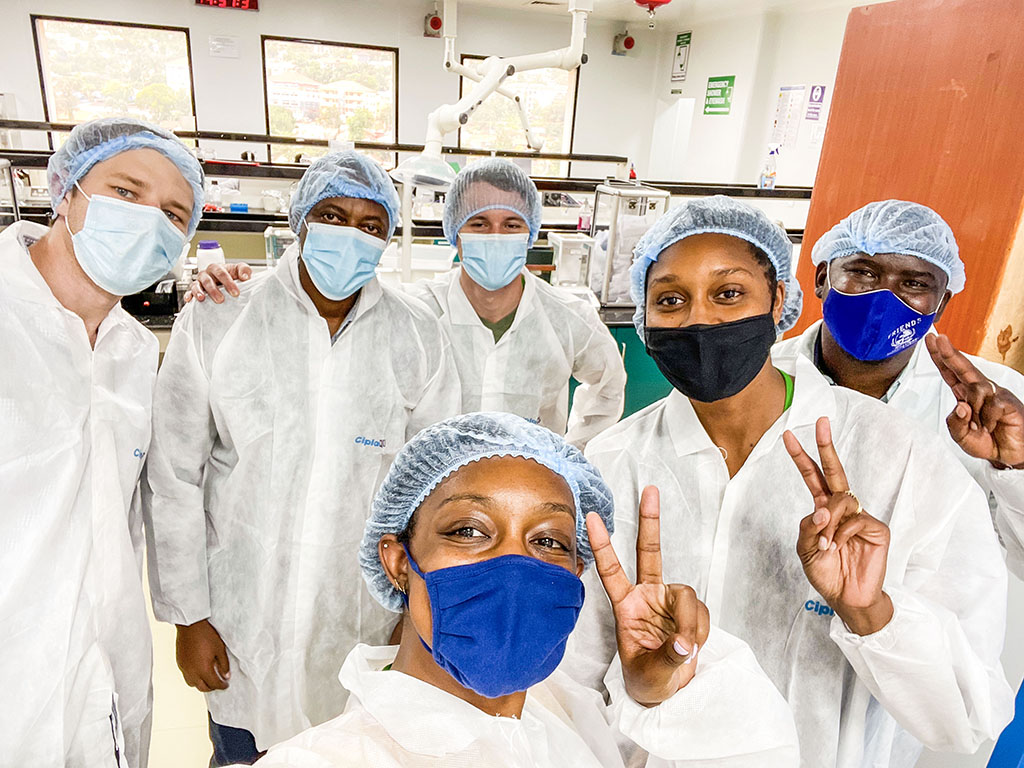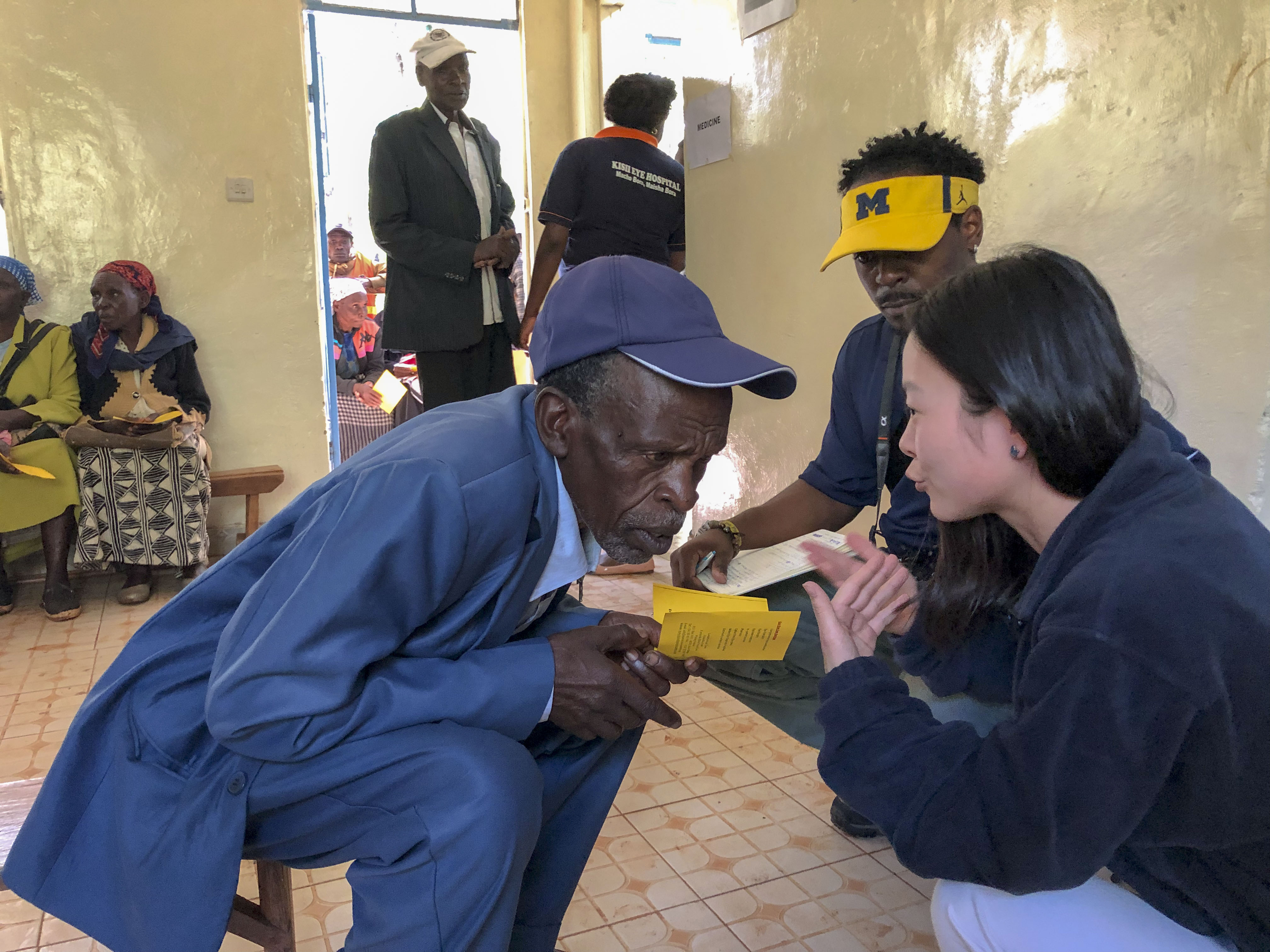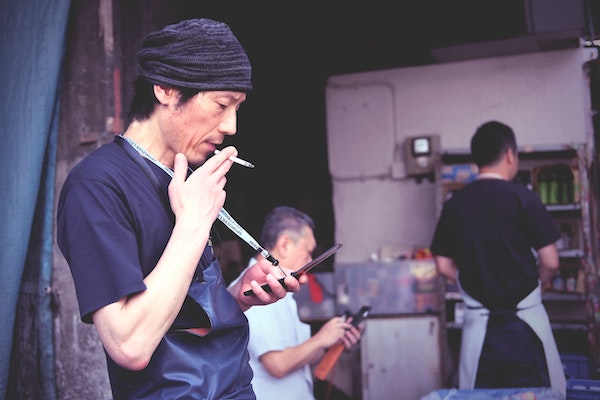
U-M Business students explore a laboratory as part of a WDI-sponsored project in Uganda with partner Busoga Health Forum (BHF). BHF’s goal is improving health in the Busoga region by developing new services and products. The U-M team provided a market assessment and recommendations for developing a diabetes product.
When faced with the task of choosing her MBA project, Alexis Kenworthy, a dual-degree graduate student, knew she could rely on the William Davidson Institute (WDI). She’d already connected with the Institute to work on the International Investment Fund project, and she’d been prioritizing international work since before her time at the University of Michigan’s Ross School of Business.
“WDI provides opportunities that I didn’t see exist in the traditional classroom setting. Business is becoming so international, and WDI is on the forefront of that,” said Kenworthy, who participated in two WDI-sponsored projects.
As Kenworthy noted, substantial real-world experiences elevate a business education, and each year students at the University of Michigan’s Ross School of Business integrate these critical pieces of the academic puzzle. MBA students are asked to complete Multidisciplinary Action Projects (MAPs) in their first year, internships between their first and second years, and practical courses founded in action-based learning. Students looking to make an international impact through these requirements needn’t look far. WDI has supported global connections for more than 1,700 students through internships, courses and MAPs, in more than 60 countries since the Institute was founded thirty years ago. And this year was no different.
Twenty graduate students pursuing their MBA at Ross participated in WDI-supported MAPs in 2022, helping advance the work of WDI partner organizations in Ghana, India, Uganda and Ukraine (virtually).
WDI offers projects, internships, and coursework that bridge academia and business — and a dedicated group of students who have completed at least two of these opportunities and demonstrated a commitment to addressing business challenges in low- and middle-income countries can attain a special designation: Davidson Field Scholars.
This select group of U-M graduate students actively engage with WDI and commit themselves to working with international partner organizations. For the 2021-2022 academic year WDI hosted five graduate students as scholars.
Kenworthy signed up and dug into her project — one that eventually allowed her to become a Davidson Field Scholar. In 2021, Kenworthy worked with a team of students to consult Private Equity Support, an organization in Kenya that assists small businesses in gaining seed funding, in boosting business efficiencies. She and her team analyzed organizational processes to find ways to streamline resources and improve reach. After working closely with the business, the team made recommendations on adopting automated procedures, eliminating unnecessary meetings, and decreasing labor-intensive efforts.
Kenworthy also recommended that the group tap into WDI’s extensive network. These connections serve students, professionals, and organizations, and that was the case for both Kenworthy and Private Equity Support. Through the network, the consulting team was able to find guidance on managing related business challenges, and Private Equity Support was able to find partners that have walked a similar path.
It’s an experience she said she never could have had without WDI’s guidance. “There’s so much to learn, and WDI can help provide that,” Kenworthy added.
Kenworthy’s desire to stretch her international business experience is common among the scholars. Isabel Randolph, a recent MBA graduate, felt a similar pull.
She first connected with WDI for her own MAP, working to assess a potential project for a fortified-foods producer and health company in Rwanda. She turned back to WDI for her summer internship and found a Michigan Academy for Developing Entrepreneurs (MADE) role. WDI is a founding partner of MADE, along with Poornatha Foundation in India and the Zell Lurie Institute at Ross. MADE was established to support small- and medium-sized enterprises (SMEs) in low- and middle-income countries through local Entrepreneur Development Organizations (EDOs). It connects the resources of the U-M with EDOs in the field and provides additional support.
For her project, Randolph worked to connect an Indian online-training company, Poornatha, with Senegal’s Institut Africain de Management (IAM), a private business school, with the goal of growing the reach and impact of their online training programs. Her team took an extensive training curriculum from Poornatha and developed a path for implementation at IAM.
The efforts were a success. IAM launched the updated training modules and has plans to continue the collaboration. “I was very excited to hear that,” Randolph said. “On these projects, sometimes with small businesses that have big impacts, there’s only so much they can do in a day. It’s really exciting to see the pilot come to fruition, see through the whole process, and hear about the potential for future collaboration.”
There was something else special about Randolph’s project: She was the one responsible for the entire outcome. “A lot of what we do at Ross is very collaborative. You’re usually with a team, which is like my work experience. It’s important, but one thing I liked about this experience is it was basically me. I wasn’t on a team. I was working with client counterparts, but I was leading the project.” This sentiment — that students can drive real impact in the business world — is at the core of WDI’s Davidson Field Scholars programming.
For Randolph, taking on the WDI-supported project between her first and second MBA year and becoming a Davidson Field Scholar was perfect timing. She was able to step back from her coursework and apply the skills she’d been learning to the real world. She could see the reason she was completing assignments and spending time in the classroom.
“This is why we’re here in school,” she explained. “It was an awesome touchpoint right in the middle of my MBA experience. To get a chance to really use those skills, apply them, and build that confidence is a direct application of what I am learning in class.”
The project involved a high level evaluation of future geographic markets for BLP Industry artificial intelligence technology as it applies to renewable energy portfolios (namely wind and solar). Having identified Brazil as a high-potential market, a market entry strategy has been started.
Good Business Lab (GBL) is a lab that uses research to find common ground between worker well-being and good business practices. This project focused on the go-to-market strategy for two tools GBL has developed, Pratibha and STITCH (Supervisors’ Transformation Into Change Holders) are training and assessment tools designed to help transform frontline workers to supervisors. The project provided a complete market analysis and recommendations on contracting and pricing strategies.
This primer provides a comprehensive but non-technical overview of the distinct health information systems (HIS) that all together support health care delivery in low-resource settings. It opens with a historical account and landscape assessment and describes the urgent need to build a lean rigorous HIS that integrates these different components. Subsequent sections describe the individual systems that: i) track individual patient and health care provider information; ii) directly document care delivery; iii) provide public and population health data; iv) support facilities’ and community health workers’ administrative and financial functions; and v) coordinate logistics and health commodities supply chains. A separate section describes imported data, including “master data” and manufactured (e.g., “meta”) data. The primer closes with recommendations for principled HIS stewardship.

An information session for students interested in enrolling in BA685: Healthcare Delivery in Emerging Markets will be held at 5:30 p.m. on Monday, Oct. 28 at the Ross School of Business, Blau Hall Room 1210. The class is offered by Michigan Ross and is organized and primarily funded by WDI.
The class is comprised mostly of second-year MBA students, but is open to all graduate students. It provides students with on-the-ground experience in a foreign country while also contributing to the success of partner health clinics and hospitals. The class also is designed to increase participants’ international leadership capabilities and enhance their awareness of diverse business issues within the current global landscape. It is taught by WDI President Paul Clyde.
The course responds to the increasing need from future employers that managers have international business perspectives to augment their business and management knowledge. During the first part of the term, students learn about healthcare in emerging markets through lectures, guest speakers and case discussions. Students are then divided into five teams and prepared for visits to their selected country, traveling to those destinations in late February and early March.
Last year, student teams worked in Ethiopia, India, Kenya, Peru and Rwanda.

Photo by Erica Leong on Unsplash
Government health ministries in low- and middle-income countries (LMICs) have historically struggled to adequately fund healthcare services for their citizens. But as these countries transition away from donor funding over the next two decades, many will need to find new domestic revenue streams to finance these services. A new WDI white paper explores the impact of raising additional government revenue through increased tax rates on “bads,” such as tobacco, alcohol and sugary drinks.
The paper, “Revenue Estimates from Taxing ‘Bads’ in 16 Low- and Middle-Income Countries,” estimates the additional revenue generated in 2016 had higher excise tax rates been imposed on tobacco, alcohol and sugary drinks and then compares this revenue to select national economic indicators. The analysis included 16 low- and middle-income countries: Côte d’Ivoire, Democratic Republic of the Congo, Ethiopia, Haiti, India, Lao People’s Democratic Republic, Moldova, Myanmar, Niger, Papua New Guinea, Rwanda, Senegal, Sierra Leone, Tajikistan, Tanzania and Togo.

Ben Davis
“The key finding is that increased excise tax rates that result in only a modest increase in retail price can still generate an important amount of additional revenue relative to current health expenditure,” said Ben Davis, a research manager with WDI’s Healthcare sector. Davis wrote the paper with Pascale Leroueil, vice president of WDI’s Healthcare sector, and William Savedoff, senior fellow at the Center for Global Development.
The simulations showed that in 14 of the 16 countries, a tax increasing retail price by 17% could generate additional revenue that is more than 50% of the amount these governments currently spend from their own budgets on healthcare. For 7 of the 16 countries, additional revenue is more than 100% of that amount.
Davis emphasized that the study has limitations. For example, estimates do not account for income and cross-substitution effects (or when consumers switch to cheaper alternatives when a product’s price rises), and they are not adjusted based on historical experience in raising tax revenues.
While the results of the current study are broadly aligned with those recently produced by the Bloomberg Philanthropies’ Task Force on Fiscal Policy for Health, there is a slight difference in methodology. The method used by Davis and his fellow authors allowed them to incorporate several different data sources and calculation methods in the final revenue estimates. Input data were obtained from public databases, journal articles, and LMIC government websites and then used in either a “bottom up” or a “top down” calculation. The “Bottom up” calculation begins with data showing how often individuals consume tobacco, alcohol and sugary drinks while the “top down” calculation begins with the amount of money actually collected by LMIC governments that taxed these products.
Davis said these estimates could act as a starting point for a discussion between global donor organizations and country governments. “A government stakeholder might say, ‘These results are interesting. An increased excise tax on these products might be worth considering. Let’s do a deeper analysis to make sure these numbers reflect reality when we take into account all of the factors that couldn’t be captured in the initial study.’”
“This paper is a small part of a larger conversation about domestic revenue mobilization and healthcare financing in low- and middle-income countries,” Davis said. “It is a building block.”
This white paper is a modest contribution to the existing body of knowledge on potential revenue benefits from taxation of “bads” in low- and middle-income countries (LMICs). We seek to provide orders-of-magnitude responses to the questions, “For 16 LMICs, what amount of additional government revenue could have been generated in 2016 if higher excise tax rates had been imposed on tobacco, alcohol, and sugar-sweetened beverages?”, and “How does this additional government revenue compare to select national economic indicators?”.